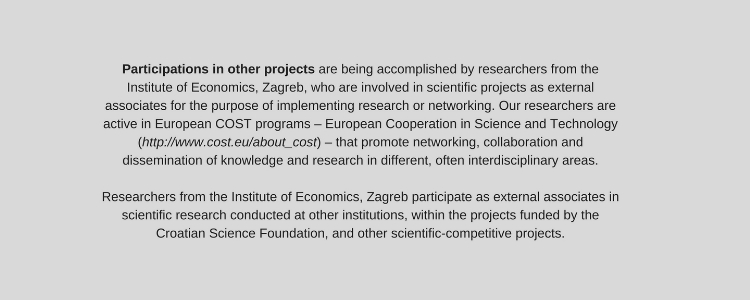HRZZ IP-2019-04-9924: Impact of taxes and benefits on income distribution and economic efficiency (ITBIDEE)
Grant holder: Institute of Public Finance
Duration: January 15, 2020 - January 14, 2024
EIZ member: Ivica Rubil
Economic efficiency is a traditional and still dominant topic of economic research. However, in the last forty years, and especially in recent times, economists increasingly emphasise the importance of studying the issues of equity in the distribution of income. It has become evident that economic analysis is not comprehensive enough if it does not deal with both economic efficiency and equity. Welfare economics conceptualises social welfare as a function that embodies both the level of total income and its distribution. Therefore, maximization of this function implies achieving a degree of compromise between economic efficiency and equity in the distribution of income. Establishing its foundations on the theoretical framework that links the concepts of efficiency and equity, this project dealt with the impact of taxes and social benefits on income distribution and economic efficiency. Taxes and social benefits have a redistributive function, but at the same time, they affect the allocation of production factors and final products, and therefore affect efficiency. Accordingly, in designing and reforming taxes and social benefits, it is necessary to take into account both equity and efficiency.
The project was empirically oriented and its purpose was two-fold. The first purpose was to improve the methodology of empirical analysis of the impact of taxes and social benefits on income distribution and economic efficiency. These improvements allowed for more comprehensive and precise analyses that yielded new empirical insights. The planned improvements were: (1) to upgrade the miCROmod by the inclusion of the module for simulation of indirect taxes, (2) to improve the credibility of survey data on income distribution, in the sense that top incomes in the sample reflect in a representative way those in the population, (3) to change the way of determining the contribution of indirect taxes to the effective tax rate.
The second purpose of the project was to conduct several empirical analyses of the impact of taxes and social benefits on income distribution and economic efficiency in Croatia. One part of the analyses relied on standard empirical practice in this area. The other part related to certain improvements of standard research practices. The set of analyses that were performed within the project included: estimating the levels and trends of income inequality; assessing the impact of direct and indirect taxes and social benefits on inequality, poverty and work incentives; assessing the optimal taxation of the highest incomes; estimating the social preferences towards redistribution of income.
The improvements of selected aspects of empirical analysis in this area contribute to international academic literature by introducing novelties that can affect the results of analyses carried out by numerous researchers; new findings can bring changes to the current knowledge. Empirical research for Croatia offered results usable in considering the often-invoked reforms of the tax-benefit system. Although the project did not address all relevant empirical issues, it made initial steps towards establishing a culture of evidence-based public debate on the desirability and adequacy of public policies.
For more details refer to: https://www.ijf.hr/en/research/current-research/?tid=441



